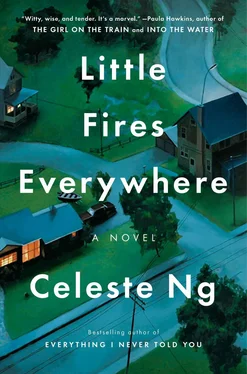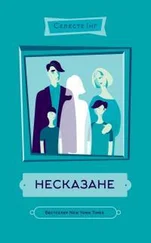“And now the McCulloughs plan to keep her?”
“I think so.” Lexie opened the cupboard and helped herself to a Nutri-Grain bar. “They’ve wanted a baby forever and then Mirabelle appeared. Like a miracle. And they’ve been trying to adopt for so long. They’ll be such devoted parents.” She peeled the wrapper from the granola bar and popped it into the garbage can and went upstairs, leaving Mia deep in thought.
Mia’s arrangement with Mrs. Richardson paid for their rent, but she and Pearl still needed money for groceries and the power bill and gas, so she had kept a few shifts per week at Lucky Palace, which between wages and leftover food was just enough to keep them supplied. Lucky Palace had a cook, a prep cook, a busboy, and one full-time waitress, Bebe, who had started a few months before Mia. Bebe had come over from Canton two years earlier, and although her English was rather choppy, she liked to talk with Mia, finding her a sympathetic listener who never corrected her grammar or seemed to have trouble understanding her. While they rolled plastic silverware in napkins for the dinner takeout orders, Bebe had told Mia quite a lot about her life. Mia shared very little in return, but she’d learned over the years that people seldom noticed this, if you were a good listener—which meant you kept the other person talking about herself. Over the course of the past six months she’d learned nearly all of Bebe’s life story, and it was because of this that Lexie’s account of the party had caught her attention.
For Bebe, a year earlier, had had a baby. “I so scared then,” she told Mia, fingers working the soft paper of the napkin. “I have nobody to help me. I cannot go to work. I cannot sleep. All day long I just hold the baby and cry.”
“Where was the baby’s father?” Mia had asked, and Bebe had said, gone. “I tell him I having a baby, two weeks later he disappear. Somebody told me he move back to Guangdong. I move here for him, you know that? Before that we living in San Francisco, I am work in dentist’s office as a receptionist, I get good money, really nice boss. He get a job here in the car plant, he say, Cleveland is nice, Cleveland is cheap, San Francisco so expensive, we move to Cleveland, we can buy a house, have a yard. So I follow him here and then—”
She was silent for a moment, then dropped a neat rolled-up napkin onto the pile, chopsticks, fork, and knife all swaddled together inside. “Here nobody speak Chinese,” she said. “I interview for receptionist, they tell me my English not good enough. Nowhere I can find work. Nobody to watch the baby.” She had probably had postpartum depression at the very least, Mia realized, perhaps even a postpartum psychotic break. The baby wouldn’t nurse, and her milk had dried up. She had lost her job—a minimum-wage post packing Styrofoam cups into cartons—when she’d gone into the hospital to have the baby, and had no money for formula. At last—and this was the part that Mia felt could not be a coincidence—she had, in desperation, gone to a fire station and left her baby on the doorstep.
Two policemen had found Bebe several days later, lying under a park bench, unconscious from dehydration and hunger. They’d brought her to a shelter, where she’d been showered, fed, prescribed antidepressants, and released three weeks later. But by then no one could tell her what had happened to her baby. A fire station, she had insisted, she’d left the baby at a fire station. No, she couldn’t remember which. She had walked with the baby in her arms, round and round the city, trying to figure out what to do, and at last she’d passed a station, the windows glowing warm against the dark night, and she’d made up her mind. How many fire stations could there be? But no one would help her. When you left her, you terminated your rights, the police told her. Sorry. We can’t give you any more information.
Bebe, Mia knew, was desperate to find her daughter again, had been searching for her for many months now, ever since she’d gotten herself back together. She had a job now, a steady if low-paying one; she’d found a new apartment; her mood had stabilized. But she hadn’t been able to find out where her baby had gone. It was as if her child had simply disappeared. “Sometimes,” she told Mia, “I wonder if I am dreaming. But which one is the dream?” She dabbed her eyes with the back of her cuff. “That I can’t find my baby? Or that I have the baby at all?”
In all her years of itinerant living, Mia had developed one rule: Don’t get attached. To any place, to any apartment, to anything. To anyone. Since Pearl had been born they’d lived, by Mia’s count, in forty-six different towns, keeping their possessions to what would fit in a Volkswagen—in other words, to a bare minimum. They seldom stayed long enough to make friends anywhere, and in the few cases where they had, they’d moved on with no forwarding address and lost contact. At each move, they discarded everything they could leave behind, and sent off Mia’s art to Anita to be sold, which meant they’d never see it again.
So Mia had always avoided getting involved in the affairs of others. It made everything simpler; it made it easier when their lease was up or she’d grown tired of the town or she’d felt, uneasily, that she wanted to be elsewhere. But this, with Bebe—this was different. The idea that someone might take a mother’s child away: it horrified her. It was as if someone had slid a blade into her and with one quick twist hollowed her out, leaving nothing inside but a cold rush of air. At that moment Pearl came into the kitchen in search of a drink and Mia wrapped her arms around her daughter quickly, as if she were on the edge of a precipice, and held her so long and so tightly that Pearl finally said, “Mom. Are you okay?”
These McCulloughs, Mia was sure, were good people. But that wasn’t the point. She thought suddenly of those moments at the restaurant, after the dinner rush had ended and things were quiet, when Bebe sometimes rested her elbows on the counter and drifted away. Mia understood exactly where she drifted to. To a parent, your child wasn’t just a person: your child was a place, a kind of Narnia, a vast eternal place where the present you were living and the past you remembered and the future you longed for all existed at once. You could see it every time you looked at her: layered in her face was the baby she’d been and the child she’d become and the adult she would grow up to be, and you saw them all simultaneously, like a 3-D image. It made your head spin. It was a place you could take refuge, if you knew how to get in. And each time you left it, each time your child passed out of your sight, you feared you might never be able to return to that place again.
Early, early on, the very first night she and Pearl had begun their travels, Mia had curled up on their makeshift bed in the backseat of the Rabbit, with baby Pearl snuggled in the curve of her belly, and watched her daughter sleep. There, so close that she could feel Pearl’s warm, milky breath on her cheek, she had marveled at this little creature. Bone of my bones and flesh of my flesh, she had thought. Her mother had made her go to Sunday school every week until she was thirteen, and as if the words were a spell she suddenly saw hints of her mother’s face in Pearl’s: the set of the jaw, the faint wrinkle between the eyebrows that appeared as Pearl drifted into a puzzling dream. She had not thought about her mother in some time, and a sharp bolt of longing flashed through her chest. As if it had disturbed her, Pearl yawned and stretched and Mia had cuddled her closer, stroked her hair, pressed her lips to that unbelievably soft cheek. Bone of my bones and flesh of my flesh, she had thought again as Pearl’s eyes fluttered closed once more, and she was certain that no one could ever love this child as she did.
Читать дальше












